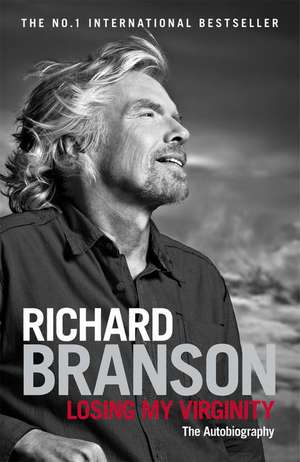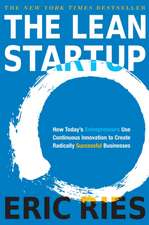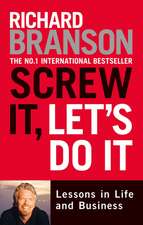Losing My Virginity
Autor Richard Bransonen Limba Engleză Paperback – 7 mai 2009
This is the bestselling autobiography of iconic entrepreneur Sir Richard Branson, featuring his take on his latest business ventures, personal achievements and intrepid adventures. You'll discover how Sir Richard is committed to building a better world through responsible, holistic business practices and ventures such as the Virgin Health Bank, which is contributing to regenerative medicine, Virgin Fuels, which has pledged GBP200 million to renewable energy projects, and his company's charitable arm, Virgin Unite. You'll also learn about how Sir Richard and his company are reaching for the stars in a new era of commercial space travel with Virgin Galactic.
| Toate formatele și edițiile | Preț | Express |
|---|---|---|
| Paperback (2) | 74.08 lei 24-35 zile | +33.11 lei 4-10 zile |
| Transworld Publishers Ltd – 7 mai 2009 | 74.08 lei 24-35 zile | +33.11 lei 4-10 zile |
| Crown Business – 31 mai 2011 | 114.36 lei 3-5 săpt. |
Preț: 74.08 lei
Preț vechi: 85.33 lei
-13% Nou
14.18€ • 14.77$ • 11.79£
Carte disponibilă
Livrare economică 24 ianuarie-04 februarie 25
Livrare express 04-10 ianuarie 25 pentru 43.10 lei
Specificații
ISBN-10: 0753519550
Pagini: 592
Ilustrații: 2 x 16pp b&w; 2 x 16pp colour
Dimensiuni: 128 x 198 x 45 mm
Greutate: 0.53 kg
Editura: Transworld Publishers Ltd
Colecția Virgin Books
Seria Bestsellers cărți Biografii celebre
Locul publicării:United Kingdom
Recenzii
-- Ivana Trump
“Few people in contemporary business are as colorful, shrewd, and irreverent, and probably no one’s nearly as much fun to be around. . . . Branson embodies America’s cherished mythology of the iconoclastic, swashbuckling entrepreneur."
-- GQ
“Branson wears his fame and money exceedingly well: no necktie, no chauffeur, no snooty clubs. . . . What continues to set Branson apart is the unique -- and, to some, baffling -- nature of his ambition. . . . He isn’t interested in power in the usual sense of influencing other people. . . . Boiled down to its singular essence, Richard Branson just wants to have fun.”
-- Newsweek
“Branson, a self-described ‘adventure capitalist,’ is a business-creation engine who was clearly born in the wrong place. . . . Those business instincts are matched by an ability to motivate people who work for him. And who wouldn’t want to -- Branson seems hell-bent on making sure that everybody, but everybody, is having as much fun as he is.”
-- Time
“Richard Branson . . . is dressed to the nines: in a $10,000 white silk bridal gown with a traditional veil and train and acres of lace. . . . Branson is expected to do the unexpected, even the bizarre -- anything to publicize his latest venture. . . . The fact is, Branson’s widely reported stunts seem almost staid compared to the unconventional way he manages his burgeoning empire.”
-- Forbes ASAP
Notă biografică
From the Hardcover edition.
Extras
January 1997
Tuesday, 7 January 1997, Morocco
5:30 a.m. -- I woke before Joan and sat up in bed. From across Marrakech I heard the wavering cry of the muezzins calling people to prayer over the loudspeakers. I still hadn't written to Holly and Sam, so I tore a page out of my notebook and wrote them a letter in case I didn't return.
Dear Holly and Sam,
Life can seem rather unreal at times. Alive and well and loving one day. No longer there the next. As you both know I always had an urge to live life to its full. That meant I was lucky enough to live the life of many people during my 46 years. I loved every minute of it and I especially loved every second of my time with both of you and Mum.
I know that many people thought us foolish for embarking on this latest adventure. I was convinced they were wrong. I felt that everything we had learned from our Atlantic and Pacific adventures would mean that we'd have a safe flight. I thought that the risks were acceptable. Obviously I've been proved wrong.
However, I regret nothing about my life except not being with Joan to finally help you grow up. By the ages of 12 and 15 your characters have already developed. We're both so proud of you. Joan and I couldn't have had two more delightful kids. You are both kind, considerate, full of life (even witty!). What more could we both want.
Be strong. I know it won't be easy. But we've had a wonderful life together and you'll never forget all the good times we've had.
Live life to its full yourselves. Enjoy every minute of it. Love and look after Mum as if she's both of us.
I love you,
Dad
* * *
I folded the letter into a small square and put it in my pocket. Fully clothed and ready, I lay down beside Joan and hugged her. While I felt wide awake and nervous, she felt warm and sleepy in my arms. Holly and Sam came into our room and cuddled into bed between us. Then Sam slipped off with his cousins to go to the launch site and see the balloon in which I hoped shortly to fly around the world. Joan and Holly stayed with me while I got dressed and spoke to Martin, the meteorologist. The flight, he said, was definitely on; we had the best weather conditions we'd had for five years. I then called Tim Evans, our doctor. He had just been with Rory McCarthy, our third pilot, and had bad news: Rory couldn't fly. He had mild pneumonia, and if he was in a capsule for three weeks, it could get much worse. I immediately called up Rory and commiserated with him.
"See you in the dining room," I said. "Let's have breakfast."
6:20 a.m. -- By the time Rory and I met in the hotel dining room, it was deserted. The journalists who had been following the preparations for the launch over the previous twenty-four hours had already left for the launch site.
Rory and I met and hugged each other. We both cried. As well as becoming a close friend as our third pilot on the balloon flight, Rory had been joining forces with me recently on a number of business deals. Just before we had come to Morocco, he had bought a share in our new record label, V2, and had invested in Virgin clothes and Virgin Vie, our new cosmetics company.
"I can't believe I'm letting you down," Rory said. "I'm never ill-never, ever."
"Don't worry," I assured him. "It happens. We've got Alex, who weighs half your weight. We'll fly far further with him on board."
"Seriously, if you don't come back," Rory said, "I'll carry on where you left off."
"Well, thanks," I said, laughing nervously.
Alex Ritchie was already out at the launch site, supervising the mad dash to get the capsule ready with Per Lindstrand, the veteran hot-air balloonist who had introduced me to the sport. Alex was the brilliant engineer who had designed the capsule and the pressurizing system. Until then, no one had succeeded in building a system that could sustain balloon flights at jet-stream levels. Although he had built both our Atlantic and Pacific capsules, I didn't know him, and it was too late to find out much about him now. Despite having no flight training, Alex had bravely made the decision to come with us. If all went well with the flight, we'd have about three weeks to get to know one another-about as intimately as any of us would want.
Unlike our crossings of the Pacific and Atlantic Oceans by hot-air balloon, on this trip we would not heat air until we needed to; the balloon had an inner core of helium, which would take us up. Per's plan was to heat the air around that core during the night; this in turn would heat the helium, which would otherwise contract and grow heavy and sink.
Joan, Holly, and I held hands and the three of us embraced. It was time to go.
8:30 a.m. -- We all saw it at the same time. As we drove along the dirt road out to the Moroccan air base, it looked as if a new mosque had sprouted overnight. Above the bending, dusty palm trees, a stunning white orb rose like a mother-of-pearl dome. It was the balloon. Men on horseback galloped along the side of the road, guns slung over their shoulders, heading for the air base. Everyone was drawn to this huge, gleaming white balloon hanging in the air, tall and slender
9:15 a.m. -- The balloon was cordoned off, and around the perimeter railing was an amazing collection of people. The entire complement of the air base stood off to one side in serried ranks, dressed in smart navy-blue uniforms; in front of them was the traditional Moroccan collection of dancing women, wearing white shawls, hollering, wailing, and whooping. Then a group of horsemen dressed in Berber costume and brandishing antique muskets galloped into view and lined up in front of the balloon. For an awful moment, I thought they would fire a celebratory salvo and puncture the balloon. Per, Alex, and I gathered in the capsule and completed a final check of all the systems. The sun was rising rapidly, and the helium was beginning to expand.
10:15 a.m. -- We had done all the checks and were ready to go. I hugged Joan and Holly and Sam one last time. I was amazed at Joan's strength. Holly had been by my side for the last four days, and she too appeared to be totally in control of the situation. I thought that Sam was as well, but then he burst into tears and pulled me toward him, refusing to let go. I almost started crying too. I will never forget the anguished strength of his hug. Then he kissed me and let go and hugged Joan. I ran across to kiss Mum and Dad good-bye. Mum pressed a letter into my hand. "Open it after six days," she said. I silently hoped that we would last that long.
10:50 a.m. -- There was nothing left to do except to climb up the steel steps into the capsule. For a second I hesitated and wondered when and where I would put my feet back on solid ground-or water. There was no time to think ahead. I stepped in through the hatch. Per was by the main controls; I sat by the camera equipment; and Alex sat in the seat by the trapdoor.
11:19 a.m. -- 10, 9, 8, 7, 6, 5-Per counted down and I concentrated on working the cameras. My hand kept darting down to check my parachute buckle. I tried not to think about the huge balloon above us, and the six vast fuel tanks strapped around our capsule-4, 3, 2, 1 . . . and Per threw the lever that fired the bolts that severed the anchor cables, and we lifted silently and swiftly into the sky. There was no roar of the burners; our ascent was like that of an enormous party helium balloon. We just rose up, up, and away, and then as we caught the morning breeze we headed over Marrakech.
The emergency door was still open as we soared up, and we waved at the by then little people below. Every detail of Marrakech-its square pink walls, the large town square, the green courtyards and fountains hidden behind high walls-was laid out beneath us. By 10,000 feet it became cold and the air grew thin. We shut the trapdoor. From then on we were on our own. We were pressurized, and the pressure would mount.
Our first fax came through the machine just after midday.
"Oh God!" Per handed it over. "Look at this."
"Please be aware that the connectors on the fuel tanks are locked on."
This was our first mistake. The connectors should have been locked off so that if we got into trouble and started falling, then we could jettison a one-ton fuel tank by way of ballast.
"If that's our only mistake, we're not doing badly," I said, trying to cheer Per up.
"We need to get down to five thousand feet, and then I'll climb out and unlock them," Alex said. "It's not a problem."
It was impossible to lose height during the day because the sun was heating the helium. The only immediate solution was to release helium, which, once released, would be impossible to regain. We couldn't afford to lose any helium, so we agreed to wait for nightfall to bring the balloon down. It was a nagging worry. We didn't know how this balloon would fly at night, and with our fuel tanks locked on, our ability to escape trouble was limited.
Although Alex and I tried to brush off the locked canisters, it sent Per into a fierce depression. He sat slumped by the controls in a furious silence, speaking only when we asked him a direct question.
We flew serenely for the rest of the day. The views over the Atlas Mountains were exhilarating, their jagged peaks capped with snow, gleaming up at us in the glorious sunshine. The capsule was cramped, full of supplies to last us eighteen days. However, locking off the connectors was not the only thing we'd forgotten to do. We'd also neglected to pack any lavatory paper, so we had to wait to receive faxes before we could go down the tiny spiral staircase to the loo. And my Moroccan stomach was in need of a lot of faxes. Per maintained his glowering silence, but Alex and I were just grateful that we knew then rather than finding out later the hard way.
As we approached the Algerian border we had a second shock when the Algerians informed us that we were heading straight for Béchar, their top military base, and told us that we could not fly over it. "You are not, repeat not, authorized to enter this area," said the telex.
We had no choice.
I spent about two hours on the satellite phone to Mike Kendrick, our flight controller, and tried various British ministers. Eventually André Azoulay, the Moroccan minister who had ironed out all our problems for the launch in Morocco, came to the rescue again. His explanation to the Algerians that we could not change our direction and that we did not have powerful cameras on board was accepted, and they relented. As the good news came through, I scribbled down all the notes and turned over another page in my logbook. There was a handwritten note from Sam, in thick black ink and Sellotaped to the page: "To Dad, I hope you have a great time. Safe journey. Lots and lots of love, your son Sam." I recalled that he'd slipped into the capsule without me last night, and now I knew why.
By five o'clock in the afternoon we were still flying at 30,000 feet, and Per started firing the burners to heat the air inside the envelope. Although we burned steadily for an hour, just after 6 p.m. the balloon started losing height steadily.
"Something's wrong with the theory here," Per said.
"What's the matter?" I asked.
"I don't know."
Per was firing the burners continuously, but the balloon was still heading down. We lost 1,000 feet, and then another 500 feet. It was getting colder all the time as the sun disappeared. It was clear that the helium was rapidly contracting, becoming a dead weight on top of us.
"We've got to dump ballast," Per said. He was frightened. We all were. We pulled levers to dump the lead weights that were on the bottom of the capsule. These were meant to be held in reserve for about two weeks. They fell away from the capsule and I saw them on my video screen, dropping like bombs. I had a horrible feeling that this was just the start of a disaster. The capsule was bigger than the Atlantic and Pacific ones, but it was still a metal box hanging off a giant balloon, at the mercy of the winds and weather.
It was now getting dark. Without the lead weights, we steadied for a while, but then the balloon started falling once more. This time the fall was faster. We fell 2,000 feet in one minute, 2,000 feet the next. My ears went numb and then popped, and I felt my stomach rising up, pressing against my rib cage. We were at only 15,000 feet. I tried to stay calm, focusing intently upon the cameras and the altimeter, rapidly going through the options available. We needed to jettison the fuel tanks. But as soon as we did so, the trip would be over. I bit my lip. We were somewhere over the Atlas Mountains in darkness, and we were heading for a horrible crash landing. None of us spoke. I made some rapid calculations.
"At this rate of fall we've got seven minutes," I said.
"Okay," Per said. "Open the hatch. Depressurize."
We opened the trapdoor at 12,000 feet, dropping to 11,000 feet, and with a breathtaking rush of freezing air, the capsule depressurized. Alex and I set to work and started throwing everything overboard: food, water, oil cans, anything that wasn't built into the capsule. Everything. Even a wodge of dollars. For five minutes, this stalled our fall. There was no question of continuing. We just had to save our lives.
"It's not enough," I said, seeing the altimeter drop to 9,000 feet. "We're still falling."
"Okay, I'm going out on the roof," Alex said. "The fuel tanks have got to go."
Since Alex had practically built the capsule, he knew exactly how to undo the locks. In the panic I realized that if Rory had been on board, we'd have been stuck. We would have had no choice but to parachute. Right now we'd have been tumbling out into the night over the Atlas Mountains. The burners roared overhead, casting a fierce orange light over us.
"Have you parachuted before?" I shouted at Alex.
"Never," he said.
"That's your rip cord," I said, pushing his hand to it.
"It's seven thousand feet and falling," Per called out. "Sixty-six hundred feet now."
Alex climbed through the hatch, onto the top of the capsule. It was difficult to feel how fast we were falling. My ears had blocked. If the locks were frozen and Alex wasn't able to free the fuel cans, we'd have to jump. We had only a few minutes left. I looked up at the hatch and rehearsed what we would have to do: one hand to the rim, step out, and jump into the darkness. My hand instinctively checked my parachute. I also checked to see that Per was wearing his. Per was watching the altimeter. The numbers were falling fast.
We had only 6,000 feet to play with and it was dark-no, 5,500 feet. If Alex was up there for another minute, we'd have 3,500 feet. I stood with my head through the hatch, paying out the strap and watching Alex as he worked his way around the top of the capsule. It was pitch-dark below us and freezing cold. We couldn't see the ground. The phone and fax were ringing incessantly. Ground control must have been wondering what the hell we were doing.
"One's off," Alex shouted through the hatch.
"Thirty-seven hundred feet," Per said.
"Another one," Alex said.
"Thirty-four hundred feet."
"Another one."
"Twenty-nine hundred feet; twenty-four hundred."
It was too late to bail out. By the time we'd jumped, we'd be smashing into the mountains rushing up to meet us.
"Get back in," Per yelled. "Now."
Alex fell back through the hatch.
We braced ourselves. Per threw the lever to disconnect a fuel tank. If this bolt failed, we'd be dead in about sixty seconds. The tank dropped away, and the balloon jerked to an abrupt halt. It felt like an elevator hitting the ground. We were flattened into our seats; my head crammed down into my shoulders. Then the balloon began to rise. We watched the altimeter: 2,600; 2,700; 2,800 feet. We were safe. In ten minutes we were up past 3,000 feet and the balloon was heading up into the night sky.
I knelt on the floor beside Alex and hugged him.
"Thank God you're with us," I said. "We'd be dead without you."
They say that a dying man reviews his life in the final seconds before his death. In my case this was not true. As we had hurtled down toward becoming a fireball on the Atlas Mountains and I thought that we were going to die, all I could think of was that if I escaped with my life, I would never do this again. As we rose toward safety, Alex told us a story of a rich man who had set out to swim the English Channel: he went down to the beach, set up his deck chair, laid his table with cucumber sandwiches and strawberries, and then announced that his man would now swim the Channel for him. At this moment, it didn't sound like such a bad idea.
Throughout that first night, we fought to control the balloon. At one point it started a continuous ascent, rising for no apparent reason. We finally realized that one of the remaining fuel tanks had sprung a leak and we had been unwittingly jettisoning fuel. As dawn approached, we made preparations to land. Below was the Algerian desert, an inhospitable place at the best of times, more so in a country in the middle of a civil war.
The desert was not the yellow sandy sweep of soft dunes that you expect from Lawrence of Arabia. The bare earth was red and rocky, as barren as the surface of Mars, the rocks standing upright like vast termites' nests. Alex and I sat up on the roof of the capsule, marveling at the dawn as it broke over the desert. We were aware that this was a day that we might not have survived to see. The rising sun and the growing warmth of the day seemed infinitely precious. Watching the balloon's shadow slip across the desert floor, we found it hard to believe that it was the same contraption that had plummeted toward the Atlas Mountains in the middle of the night.
The still-attached fuel tanks were blocking Per's view, so Alex talked him in to land. As we neared the ground, Alex shouted out:
"Power line ahead!"
Per shouted back that we were in the middle of the Sahara and there couldn't possibly be a power line. "You must be seeing a mirage!" he bawled.
Alex insisted that he come up and see for himself: we had managed to find the only power line in the Sahara.
Despite the vast, barren desert all around us, within minutes of landing there were signs of life. A group of Berber tribesmen materialized from the rocks. At first they kept their distance. We were about to offer them some water and the few remaining supplies, when we heard the clattering roar of gunship helicopters. They must have tracked us on the radar. As quickly as they had appeared, the Berber vanished. Two helicopters landed close by, throwing up clouds of dust, and soon we were surrounded by impassive soldiers holding machine guns, apparently unsure where to point them.
"Allah," I said encouragingly. For a moment they stood still, but their curiosity got the better of them and they came forward. We showed their officer around the capsule, and he marveled at the remaining fuel tanks. As we stood around the capsule, I wondered what these Algerian soldiers thought of it.
Looking back at the capsule, I saw it for a moment through their eyes. The remaining fuel tanks were painted like huge cans of Virgin Cola and Virgin Energy in bright red and yellow. Among the many slogans on the side of the capsule were ones for Virgin Atlantic, Virgin Direct, Virgin Territory, and Virgin Cola. It was probably lucky for us that the devoutly Muslim soldiers could not understand the writing around the top of the Virgin Energy can: despite what you may have heard there is absolutely no scientific evidence that virgin energy is an aphrodisiac.
As I looked at the capsule standing in the red sand, and relived the harrowing drop toward the Atlas Mountains, I renewed my vow that I would never attempt this again. Likewise, in perfect contradiction to this, at the back of my mind I also knew that as soon as I was home and talked to the other balloonists who were trying to fly around the world, then I would agree to have one last go. It's an irresistible challenge, and it's now buried too deeply inside me for me to give up.
The two questions I am most often asked are, Why do you risk your neck ballooning? and Where is the Virgin Group going? In some ways the sight of the ballooning capsule standing in the middle of the Algerian desert, with its cluster of Virgin names plastered over it, summed up these prime questions.
I knew that I would attempt another balloon flight because it's one of the few great challenges left. And as soon as I've banished the terrors of each actual flight, I once again feel confident that we can learn from our mistakes and achieve the next one safely.
The wider question of where the Virgin Group will end up is impossible to answer. Rather than be too academic about it all, which is not how I think, I have written this book to demonstrate how we made Virgin what it is today. If you read carefully between the lines, you will, I hope, understand what our vision for the Virgin Group is and you will see where I am going. Some people say that my vision for Virgin breaks all the rules and is too wildly kaleidoscopic; others say that Virgin is set to become one of the leading brand names of the next century; others analyze it down to the last degree and then write academic papers on it. As for me, I just pick up the phone and get on with it. Both the series of balloon flights and the numerous Virgin companies I have established form a seamless series of challenges that I can date from my childhood.
The Virgin Cola launch in New York in May of 1998 exemplifies the type of business challenge I love. The cola market is dominated by one huge, established competitor-Coke. It's the ultimate brand and one of the world's most profitable and biggest companies. Coke has one weak competitor around the globe, Pepsi, and I like to think that Virgin will be able to use the experience we've built up during the first half of my life to give Coke its first proper competition. Coke's size doesn't intimidate me-the dinosaurs didn't last forever either. If any brand can give Coke a serious run, it's Virgin.
To show Coke that Virgin meant business, I commandeered a tank and drove it into Times Square, the crossroads of America. With the help of some clever pyrotechnicians, we rigged the Coke sign in Times Square with fireworks, and I aimed the tank's gun squarely at the sign and it went up in a burst of false flames. It was all great fun, something I want to see in every Virgin business, but it had its serious side as well. We've made a major financial and corporate commitment to the cola market, and at the very least over the next couple of years I want to see Virgin Cola edge ahead of Pepsi in America, just as we've done in the United Kingdom, where Virgin has 11.9 percent of the diet and regular cola market, ahead of Pepsi's 11.3 percent.
Our base of operations for the Coke "attack" was the Virgin Megastore in Times Square, a location, I was repeatedly advised several years ago, that should not be the one from which to launch our retail business in New York. Times Square was a squalid mess and not the right image for Virgin. But we obtained the space at very reasonable rates. Times Square is undergoing a renaissance. The Virgin Megastore not only survived, it is performing beautifully, and megastores have sprouted everywhere.
If there is a theme in this book, it is survival. Most people who start from scratch don't survive, and although I have, this is not a book of "lessons" about what I've learned. I don't want to pontificate about what you can learn from my life. Rather, I want to tell my story and use these experiences to convey my own thoughts and ideas about both business and life. While the many businesses I've started play an important role in this book, equally as important is my belief that every minute of every day should be lived as wholeheartedly as possible and that we should always look for the best in everyone and everything. Some will say, though, my greatest fault is that I can't say no. But it's led to an enjoyable, open life, and the best thing I wish readers is that they have fun reading this book.
Since Alex had practically built the capsule, he knew exactly how to undo the locks. In the panic I realized that if Rory had been on board, we'd have been stuck. We would have had no choice but to parachute. Right now we'd have been tumbling out into the night over the Atlas Mountains. The burners roared overhead, casting a fierce orange light over us.
"Have you parachuted before?" I shouted at Alex.
"Never," he said.
"That's your rip cord," I said, pushing his hand to it.
"It's seven thousand feet and falling," Per called out. "Sixty-six hundred feet now."
Alex climbed through the hatch, onto the top of the capsule. It was difficult to feel how fast we were falling. My ears had blocked. If the locks were frozen and Alex wasn't able to free the fuel cans, we'd have to jump. We had only a few minutes left. I looked up at the hatch and rehearsed what we would have to do: one hand to the rim, step out, and jump into the darkness. My hand instinctively checked my parachute. I also checked to see that Per was wearing his. Per was watching the altimeter. The numbers were falling fast.
We had only 6,000 feet to play with and it was dark-no, 5,500 feet. If Alex was up there for another minute, we'd have 3,500 feet. I stood with my head through the hatch, paying out the strap and watching Alex as he worked his way around the top of the capsule. It was pitch-dark below us and freezing cold. We couldn't see the ground. The phone and fax were ringing incessantly. Ground control must have been wondering what the hell we were doing.
"One's off," Alex shouted through the hatch.
"Thirty-seven hundred feet," Per said.
"Another one," Alex said.
"Thirty-four hundred feet."
"Another one."
"Twenty-nine hundred feet; twenty-four hundred."
It was too late to bail out. By the time we'd jumped, we'd be smashing into the mountains rushing up to meet us.
"Get back in," Per yelled. "Now."
Alex fell back through the hatch.
We braced ourselves. Per threw the lever to disconnect a fuel tank. If this bolt failed, we'd be dead in about sixty seconds. The tank dropped away, and the balloon jerked to an abrupt halt. It felt like an elevator hitting the ground. We were flattened into our seats; my head crammed down into my shoulders. Then the balloon began to rise. We watched the altimeter: 2,600; 2,700; 2,800 feet. We were safe. In ten minutes we were up past 3,000 feet and the balloon was heading up into the night sky.
I knelt on the floor beside Alex and hugged him.
"Thank God you're with us," I said. "We'd be dead without you."
They say that a dying man reviews his life in the final seconds before his death. In my case this was not true. As we had hurtled down toward becoming a fireball on the Atlas Mountains and I thought that we were going to die, all I could think of was that if I escaped with my life, I would never do this again. As we rose toward safety, Alex told us a story of a rich man who had set out to swim the English Channel: he went down to the beach, set up his deck chair, laid his table with cucumber sandwiches and strawberries, and then announced that his man would now swim the Channel for him. At this moment, it didn't sound like such a bad idea.
Throughout that first night, we fought to control the balloon. At one point it started a continuous ascent, rising for no apparent reason. We finally realized that one of the remaining fuel tanks had sprung a leak and we had been unwittingly jettisoning fuel. As dawn approached, we made preparations to land. Below was the Algerian desert, an inhospitable place at the best of times, more so in a country in the middle of a civil war.
The desert was not the yellow sandy sweep of soft dunes that you expect from Lawrence of Arabia. The bare earth was red and rocky, as barren as the surface of Mars, the rocks standing upright like vast termites' nests. Alex and I sat up on the roof of the capsule, marveling at the dawn as it broke over the desert. We were aware that this was a day that we might not have survived to see. The rising sun and the growing warmth of the day seemed infinitely precious. Watching the balloon's shadow slip across the desert floor, we found it hard to believe that it was the same contraption that had plummeted toward the Atlas Mountains in the middle of the night.
The still-attached fuel tanks were blocking Per's view, so Alex talked him in to land. As we neared the ground, Alex shouted out:
"Power line ahead!"
Per shouted back that we were in the middle of the Sahara and there couldn't possibly be a
From the Hardcover edition.




















